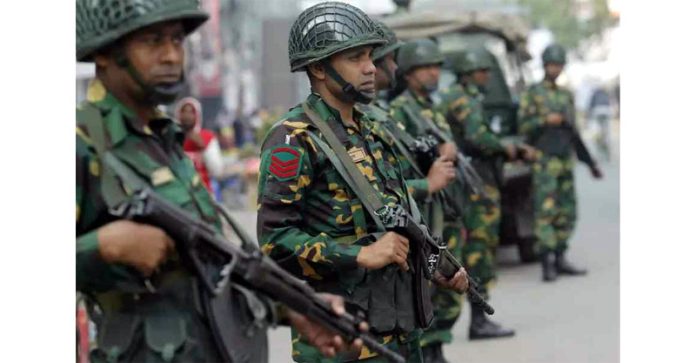DHAKA, Jan 2: Thousands of armed forces personnel will be deployed across Bangladesh from Wednesday to ensure that the January 7 general elections are held in a free, fair, and peaceful manner, the Defence Ministry said on Tuesday.
The armed forces will assist the Election Commission and local civil administration till January 10 to help maintain law and order before, during, and after the upcoming national polls, a press release by the ministry said.
The Army will be deployed in 62 districts and will perform duties jointly with the Border Guards Bangladesh (BGB) in 47 bordering upazilas, the release said.
A total of 1,151 platoons of paramilitary border guards were deployed across the country on December 29, who will work in tandem with the police, the Rapid Action Battalion (RAB), and armed forces for 13 days surrounding the January 7 polls.
More than 1.89 lakh policemen have also been deployed nationwide to ensure law and order ahead of the elections.
The BGB members will solely be deployed in 45 upazilas and will be accompanied by the Coast Guards in four coastal upazilas.
While the country’s Navy will perform duties in a total of 19 upazilas, including the coastal districts of Bhola and Barguna, the Air Force is also set to provide necessary helicopter assistance to polling stations in remote hilly areas along with electoral assistance in case of emergencies.
Special cells have also been set up jointly by representatives of the armed forces and law enforcement agencies across the country, which will remain operational till January 10, the release said.
The January 7 polls are being boycotted by the main opposition, the Bangladesh Nationalist Party (BNP) led by former prime minister Khalida Zia, as its demand for an interim non-party neutral government to organise the voting was rejected by the government headed by Prime Minister Sheikh Hasina.
Hasina is also the president of the ruling Awami League.
The BNP boycotted the 2014 election but took part in the 2018 polls, which party leaders later said was a mistake, alleging that the voting was marred with widespread rigging and intimidation.
Meanwhile, the BNP and its allies were criticised by ruling Awami League’s General Secretary Obaidul Quader on Tuesday, who said that the January 7 polls will be participatory, the Dhaka Tribune newspaper reported.
Calling the BNP’s leaflet distribution mysterious, Quader, also the road transport and bridges minister, said that the activists of the main opposition party might carry out an attack anytime.
“But they will not be able to thwart the election no matter how hard they try,” he was quoted as saying in the report.
On Monday, Prime Minister Hasina said the BNP is boycotting Sunday’s general election because they found no scope to rig the polls.
Claiming that the BNP had tried to foil the 2014 parliamentary election through violence but failed, Hasina said, “Now they are out to thwart the 12th parliamentary election slated for January 7 for which they are once again burning people to death through arson violence and subversive acts.”
The BNP has called for civil disobedience against the Hasina-led dispensation, urging people not to pay taxes and utility bills to press its demand for a non-party interim government for election oversight by amending the country’s Constitution.
It is also carrying out an anti-election street campaign, calling for intermittent strikes and transport blockades, saying no election under the incumbent government led by Hasina would be fair or neutral.
According to a media tally, 11 people died, 386 vehicles were torched, and four trains were derailed from tracks in the past two months in political violence.
The US and other major Western countries called for dialogue between the ruling Awami League and particularly with the BNP to ensure an inclusive and credible election, which, however, saw no headway due to reluctance from both sides.
With the BNP boycotting the election and no other credible opposition party against it, Hasina’s Awami League is likely to gain the upper hand and will likely form the government for the fourth consecutive term. (PTI)


